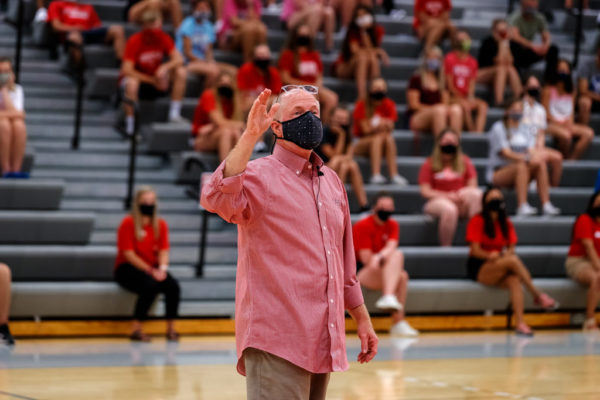
President Mark Putnam greets students during Welcome Week in August 2020 with enthusiasm for learning and safety measures for navigating campus during the pandemic.
I find myself using that phrase more often these days. The advance of technological innovation and globalization are yielding greater societal complexity. At the same time some things seem easier for the same reason. Tech trends have made it possible to support the college’s response to COVID-19 for both remote and in-person learning. I wonder what higher education would have looked like if COVID-19 had come five, 10 or 15 years earlier?
While the tools themselves change equations, so does the intelligence they lead us toward. Easy access to online information seems to make things less complicated … yet interpreting that information seems more complicated. The ability to complete many transactions online makes life easier … yet having less human interaction makes it more difficult to express the nuances of our own experience. We often think that technology makes things more customized and convenient … yet the processes also become quite uniform, forcing more conformity. In the end it feels like things are reduced … not simplified.
We have easier access to information than at any time in history to support student learning … yet the body of knowledge is expanding at a rate that makes it nearly impossible to gain full expertise.
Generally speaking, we read less deeply and find ourselves quickly scanning smaller portions of text. We write less thoughtfully as even the “one-pager” has been reduced to a slide, a text or a tweet. Some argue this approach simplifies and speeds communication. I wonder if we are actually less informed, more likely to react and find ourselves more conflicted. Again, it feels more like reduction than simplification.
This presents quite a challenge for educators, especially when the tools themselves are getting us through the pandemic, making learning possible. While many argue “less is more,” I wonder if less is just less. As we speed very young students through a learning process designed to check more boxes more quickly, we deny young learners the time it takes to process, absorb, sort, categorize and apply their learning.
In our haste to get students into a shrinking workforce, are we satisfying a short-term labor demand at the cost of long-term societal productivity? I sometimes remind policymakers they have not yet passed a law to repeal human development. As we attempt to press young high school students into premature life and career decisions, we are likely to be disappointed with the results. When we focus on career entry rather than successful persistence, we mask attrition that goes undetected.
What I have always loved about the learning community at Central College is that we begin with the learner. We remind ourselves the process of adolescent and young adult development is messy. During the past year, it has been messier than ever, and we have adapted. And so, it will ever be. Our task is to give students a center from which they can move out to explore and discover, and a foundation on which they can find a life, not just a job. In “normal times” the thoughtful integration of liberal learning, professional learning and experiential learning is the bedrock for developing well-rounded citizen-leaders who will adapt to a changing world and find solutions to emerging challenges in the workplace, local communities and society as a whole.
As educators we dare not reduce the education of our student because we want to make it easy. It’s complicated.












To encourage serious, intellectual discourse on Civitas, please include your first and last name when commenting. Anonymous comments will be removed.
Comments are closed.